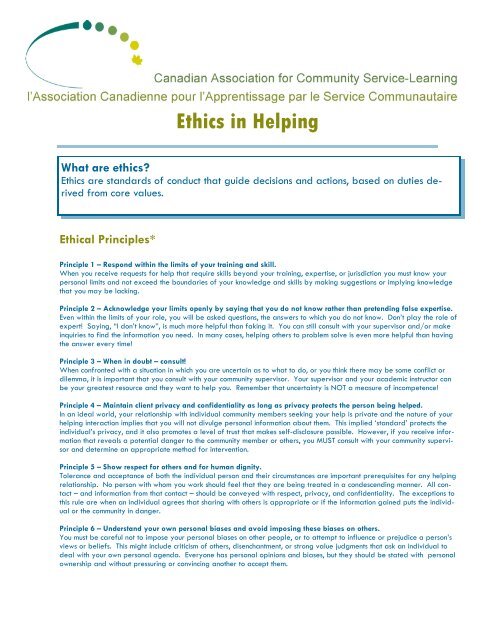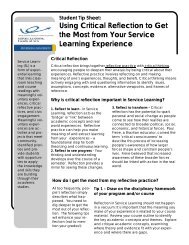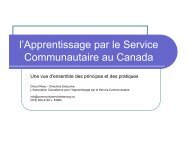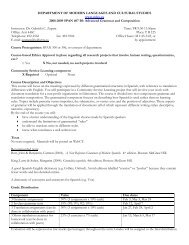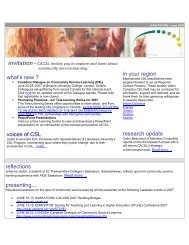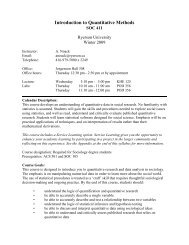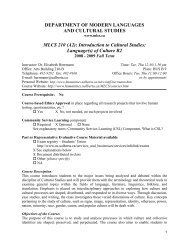Ethics.pub - Canadian Alliance for Community Service Learning
Ethics.pub - Canadian Alliance for Community Service Learning
Ethics.pub - Canadian Alliance for Community Service Learning
You also want an ePaper? Increase the reach of your titles
YUMPU automatically turns print PDFs into web optimized ePapers that Google loves.
<strong>Ethics</strong> in Helping<br />
What are ethics?<br />
<strong>Ethics</strong> are standards of conduct that guide decisions and actions, based on duties derived<br />
from core values.<br />
Ethical Principles*<br />
Principle 1 – Respond within the limits of your training and skill.<br />
When you receive requests <strong>for</strong> help that require skills beyond your training, expertise, or jurisdiction you must know your<br />
personal limits and not exceed the boundaries of your knowledge and skills by making suggestions or implying knowledge<br />
that you may be lacking.<br />
Principle 2 – Acknowledge your limits openly by saying that you do not know rather than pretending false expertise.<br />
Even within the limits of your role, you will be asked questions, the answers to which you do not know. Don’t play the role of<br />
expert! Saying, “I don’t know”, is much more helpful than faking it. You can still consult with your supervisor and/or make<br />
inquiries to find the in<strong>for</strong>mation you need. In many cases, helping others to problem solve is even more helpful than having<br />
the answer every time!<br />
Principle 3 – When in doubt – consult!<br />
When confronted with a situation in which you are uncertain as to what to do, or you think there may be some conflict or<br />
dilemma, it is important that you consult with your community supervisor. Your supervisor and your academic instructor can<br />
be your greatest resource and they want to help you. Remember that uncertainty is NOT a measure of incompetence!<br />
Principle 4 – Maintain client privacy and confidentiality as long as privacy protects the person being helped.<br />
In an ideal world, your relationship with individual community members seeking your help is private and the nature of your<br />
helping interaction implies that you will not divulge personal in<strong>for</strong>mation about them. This implied ‘standard’ protects the<br />
individual’s privacy, and it also promotes a level of trust that makes self-disclosure possible. However, if you receive in<strong>for</strong>mation<br />
that reveals a potential danger to the community member or others, you MUST consult with your community supervisor<br />
and determine an appropriate method <strong>for</strong> intervention.<br />
Principle 5 – Show respect <strong>for</strong> others and <strong>for</strong> human dignity.<br />
Tolerance and acceptance of both the individual person and their circumstances are important prerequisites <strong>for</strong> any helping<br />
relationship. No person with whom you work should feel that they are being treated in a condescending manner. All contact<br />
– and in<strong>for</strong>mation from that contact – should be conveyed with respect, privacy, and confidentiality. The exceptions to<br />
this rule are when an individual agrees that sharing with others is appropriate or if the in<strong>for</strong>mation gained puts the individual<br />
or the community in danger.<br />
Principle 6 – Understand your own personal biases and avoid imposing these biases on others.<br />
You must be careful not to impose your personal biases on other people, or to attempt to influence or prejudice a person’s<br />
views or beliefs. This might include criticism of others, disenchantment, or strong value judgments that ask an individual to<br />
deal with your own personal agenda. Everyone has personal opinions and biases, but they should be stated with personal<br />
ownership and without pressuring or convincing another to accept them.
Principle 7 – Continue to behave appropriately when working with persons <strong>for</strong> whom you feel some aversion.<br />
You may find that you are conversing with an individual <strong>for</strong> whom you feel some antagonism, dislike, or other strong<br />
emotional reaction. In these cases one must consider why the aversion is being experienced and carefully assess<br />
whether these feelings will interfere with your role. If so, it is important to consult with your supervisor.<br />
Principle 8 – Act appropriately when working with persons <strong>for</strong> whom you feel attraction.<br />
During the course of your involvement in a service placement, you may meet individuals <strong>for</strong> whom you feel interest or<br />
even attraction… you may want this person to be your friend, date, or companion. These dual relationships could<br />
compromise your helping role and should be avoided.<br />
Principle 9 – Knowing and managing your emotional response while helping another is crucial to your own<br />
well-being and to your ability to help.<br />
There may be times when statements that you have made evoke emotionally charged responses from individuals, or<br />
the <strong>pub</strong>lic ranging from anger and irritation to grief and sorrow. Students serving in helping roles must be prepared<br />
to know how to handle and even control emotional reactions by learning to set limits, accept but not absorb emotional<br />
output, and channel reactions through referral. Occasionally, an individual’s reaction may stimulate parallel<br />
feelings from your own experience. In these instances, you must follow up and use personal resources of support to<br />
debrief… there’s no need to ‘tough it out’ on your own, and it won’t make you look more competent if you do so!<br />
Principle 10 – Take responsible action if you learn about illegal behaviour.<br />
If you hear an individual report in<strong>for</strong>mation that may have elements of behaviour that is illegal or potentially unethical,<br />
you may confront the behaviour, pointing out the social norms and consequences in a manner that suggests that<br />
you are not the person to judge the behaviour, but that there are clear social norms and laws that one must abide<br />
by in a community or society. If the in<strong>for</strong>mation that has been shared implies a clear and present danger to others in<br />
the community, this in<strong>for</strong>mation should be shared with your supervisor to determine the appropriate course of action.<br />
Principle 11 – Remember that you are a role model!<br />
As a student serving in a helping role in the community you will hold a some degree of expertise and are, there<strong>for</strong>e,<br />
regarded as role models to community members. This means that you are obligated to maintain a congruence between<br />
what you say to clients in your role and how you act when you are seen (or heard) by those you are serving.<br />
Principle 12 – Maintain integrity and do not promote hearsay in commenting on professional relationships with<br />
others.<br />
As a student serving in a helping role, other students or community members may ask <strong>for</strong> your opinion. You must refrain<br />
from giving negative opinions and limit any potentially critical comment to objective facts about a community<br />
member or agency. Everyone experiences other people differently and what might have been a poor experience<br />
<strong>for</strong> you could be quite different <strong>for</strong> others.<br />
WORKS CITED<br />
Adapted from Ender, S.C. & Newton, F.B., Students Helping Students. San Francisco: Jossey-<br />
Bass. , 2000.<br />
For more in<strong>for</strong>mation, contact:<br />
<strong>Canadian</strong> Association <strong>for</strong> <strong>Community</strong> <strong>Service</strong>-<strong>Learning</strong><br />
c/o University of Guelph · Level 3, University Centre · Guelph, ON, Canada ·<br />
info@communityservicelearning.ca · www.communityservicelearning.ca<br />
Phone: (519) 824-4120, ext. 53900 · Fax: (519) 821-3995<br />
N1G 2W1


